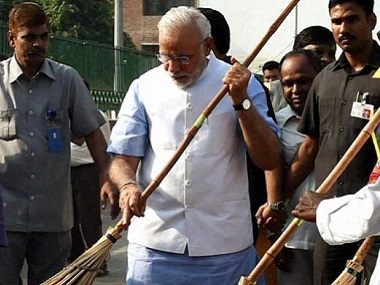Monday, 19 November, was observed as ‘World Toilet Day’ globally. The United Nations officially declared 19 November as World Toilet Day in 2013. According to the global body’s Sustainable Development Goal 6, world leaders are to ensure “availability and sustainable management of sanitation and water” for everyone by 2030.
According to the official website, at least 4.5 billion people around the world don’t have access to toilets, which means untreated excreta could contaminate water and soil “that sustain human life”. This year’s theme is about sanitation and nature. “Nature-based solutions to the sanitation and water crisis that could harness the power of ecosystems include composting latrines that collect and treat waste on-site, producing a free supply of fertiliser to help grow crops,” the website said. [caption id=“attachment_5578041” align=“alignleft” width=“380”] File photo of Prime Minister Narendra Modi during a Swachh Bharat Abhiyan drive. PTI[/caption] The impact of improper waste disposal on a global scale has a possible impact “on public health, living conditions, nutrition, education, and economic productivity across the world.” India’s own effort to achieve complete sanitation, cleanliness and availability to toilets is the Swachh Bharat Abhiyan. The Centre, under Prime Minister Narendra Modi, launched the mission on 2 October 2014 with the aim of achieving complete hygiene, especially for rural areas, by ensuring an end to open defecation by October 2019. According to the statistics provided by the official
Swachh Bharat Abhiyan website, at least 96.21 percent of the country is being covered under the mission’s “household coverage plan.” However, critics of the project have pointed out a crucial flaw, which is the gap in providing a facility for water along with toilet facilities in rural parts of India. Another criticism levelled against the project in a report by
Legal Bites is that the government has channeled more resources into marketing the mission than actual implementation on the ground. A
_Firstpost_ report says, “Four years into the implementation of the scheme and raising money for it through a Swachh Bharat cess, districts have been vying with each other to declare themselves open defecation free (ODF), purely on the basis of the number of toilets built, rather than on the basis of whether people are actually using those toilets.” In November 2017, the Centre, in a bid to improve cleanliness and basic amenities at select heritage and spiritual sites of the country, embarked upon a special clean-up drive. Tourist attractions and pilgrimage points like Hyderabad’s Charminar, Gujarat’s Somnath temple, as also the Yamunotri and Gangotri temples, were scheduled to be cleaned under the second phase of the mission’s Swachh Iconic Places (SIP) initiative. In June this year, the NTPC Limited, formerly known as National Thermal Power Corporation adopted Hyderabad’s Charminar under SIP, according to
a report by Hindu Business Line.
On World Toilet Day, here’s a brief look at India’s effort to achieve complete sanitation, cleanliness and availability to toilets, the Swachh Bharat Abhiyan.
Advertisement
End of Article


)

)
)
)
)
)
)
)
)



